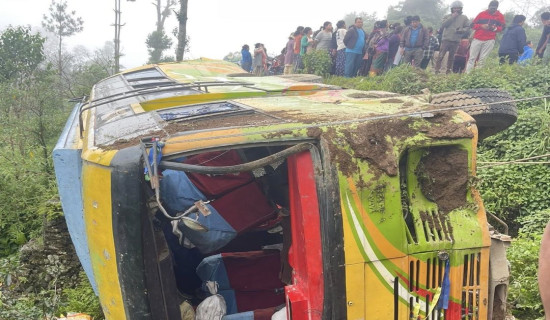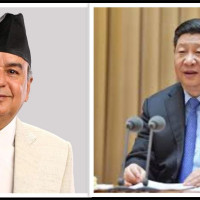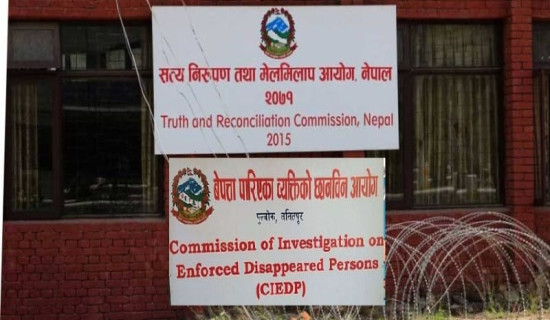- Saturday, 2 August 2025
National Paddy Day marked across country
By A Staff Reporter,Kathmandu, June 30: Farmers across the country celebrated the 22nd National Paddy Day and Paddy Planting Festival–2082 on Sunday, marking the beginning of the rice planting season with traditional festivities, including planting paddy and savouring Dahi Chiura (curd and beaten rice).
This year’s celebration carried the theme: “Intensification in Rice Crops, Food Security and Self-Reliance.”
The message of this year's National Paddy Day is to reduce the global negative impacts of climate change by researching and developing climate-adapted technologies in rice cultivation, promoting the available technologies, making farmers and other stakeholders aware of climate change impact and increasing production and productivity.
Nepal started celebrating Asar 15 as National Paddy Day from 2005 as per a minister-level decision taken on December 14, 2004. The Day is marked on the 15th day of the month of Asar every year.
The festival is celebrated with regional variations, often including singing, dancing, and playing in the mud — all symbolic of the start of the rice-growing season, known locally as ‘mano ropera muri ubjaune’ (growing a lot by sowing a little).
A central-level formal programme was organised at Khumaltar in Lalitpur to mark the day in the presence of Minister for Agriculture and Livestock Development Ramnath Adhikari. On the occasion, Minister Adhiakri planted paddy in the presence of government officials, farmers and paddy experts and others attended the programme.
Addressing the programme, Minister Adhikari has said that the government is committed to work for the benefit of the farmers despite limitations of resources and means. "It is a tradition to have to step in the mud in Asar. Unless we focus on production, the country will not prosper. There is no rice as delicious as Chaite rice, the taste of the Ghaiya rice I produce and the Marsi rice of Jumla are the same."
"We will become self-reliant in rice within two years, the government will not only make a commitment to take the farmers forward, but will also do the necessary work," he said. He said that situation of not being able to plant paddy due to lack of fertilisers will come to an end.
On the occasion, Kusum Devi Thapa, Chairman of the Agriculture, Cooperatives and Natural Resources Committee of the Federal Parliament, said that necessary instructions will be given to the government to make necessary arrangements by holding policy-level discussions in the parliamentary committee to strengthen the country's farmers and make the country self-reliant in food.
Secretary of the Ministry of Agriculture and Livestock Development Deepak Kumar Kharal emphasised on respecting the contribution made by farmers in Nepal's agricultural sector and focus on increasing rice production and reducing import.
Meanwhile, with the participation of farmers, experts and government officials, provincial and local governments celebrated the paddy day organising various programmes, including planting paddy.
According to the Department of Agriculture, paddy plantation has been completed in around 15.6 per cent of the country’s total paddy fields so far. Paddy has been planted in 15.6 per cent (217,289 hectares) of the total paddy fields (1.4 million hectares) across the country.
According to the Department, paddy has been planted in 45.5 per cent (80,128 hectares) of the total paddy fields in Sudurpashchim Province, 39.1 per cent (16,000 hectares) in Karnali Province, 20.5 per cent (24,743 hectares) in Bagmati Province and 9.7 per cent (29,251 hectares) in Lumbini Province.
Likewise, 13.8 per cent (12,990 hectares) paddy plantation has been completed in Gandaki Province, 14.3 per cent (39,390 hectares) in Koshi Province and 3.9 per cent (14,785 hectares) in Madhes Province.
According to our Surkhet correspondent, Chief Minister of Karnali Province Yam Lal Kandel has said that agriculture is a strong foundation of Karnali Province's economic prosperity. He made this remark while addressing the 22nd National Paddy Day and Planting Festival organised by the All Nepal Peasants’ Federation, District Committee Surkhet in Birendranagar on Sunday.
He said that the path to self-reliance in agriculture should be chosen and for that, the traditional system should be modified and a modern, scientific and professional agricultural system should be adopted.
Chief Minister Kandel said that agriculture should not only be a means of livelihood but also the agricultural profession should be developed as a permanent source of income and employment.
According to our Lumbini correspondent, Chief Minister of Lumbini Province Chet Narayan Acharya said that the provincial government was looking for ways to reduce the cost of rice farming. Expressing his best wishes on the occasion of the 22nd National Rice Day, he said that if farmers' costs are reduced, production can be increased.
Stating that the Constitution of Nepal ensures the right to food to the citizens, Chief Minister Acharya expressed the view that strong policies, practical programmes and dedicated implementation are necessary to achieve the national goal of food security.
He said that the provincial government has focused on timely supply of improved seeds, chemical fertilisers, mechanisation of farming and production of skilled manpower.
Meanwhile, according to our Taplejung correspondent, on the occasion of the 22nd National Rice Day, a mass plantation was carried out in Bahanande Tole of Dokhu, Phungling Municipality-8 on Sunday.
The mass planting was carried out on the occasion of National Paddy Day organized by the National Farmers’ Group Federation Nepal, Taplejung with the support of the Agricultural Knowledge Centre, said Bimala Pokharel, acting chief of the Agricultural Knowledge Centre, Taplejung.
According to AKC, Taplejung, around 18 per cent paddy plantation was completed in the district so far. Being a mountainous district, paddy plantation begins in Taplejung from the second week of Jestha.
Although plantation begins from the month of Jestha, about 12 per cent less paddy has been planted here by the second week of Asar compared to last year. Around 29.4 per cent paddy plantation had been done by the second week of Asar last year.











-original-thumb.jpg)

-original-thumb.jpg)
-original-thumb.jpg)
